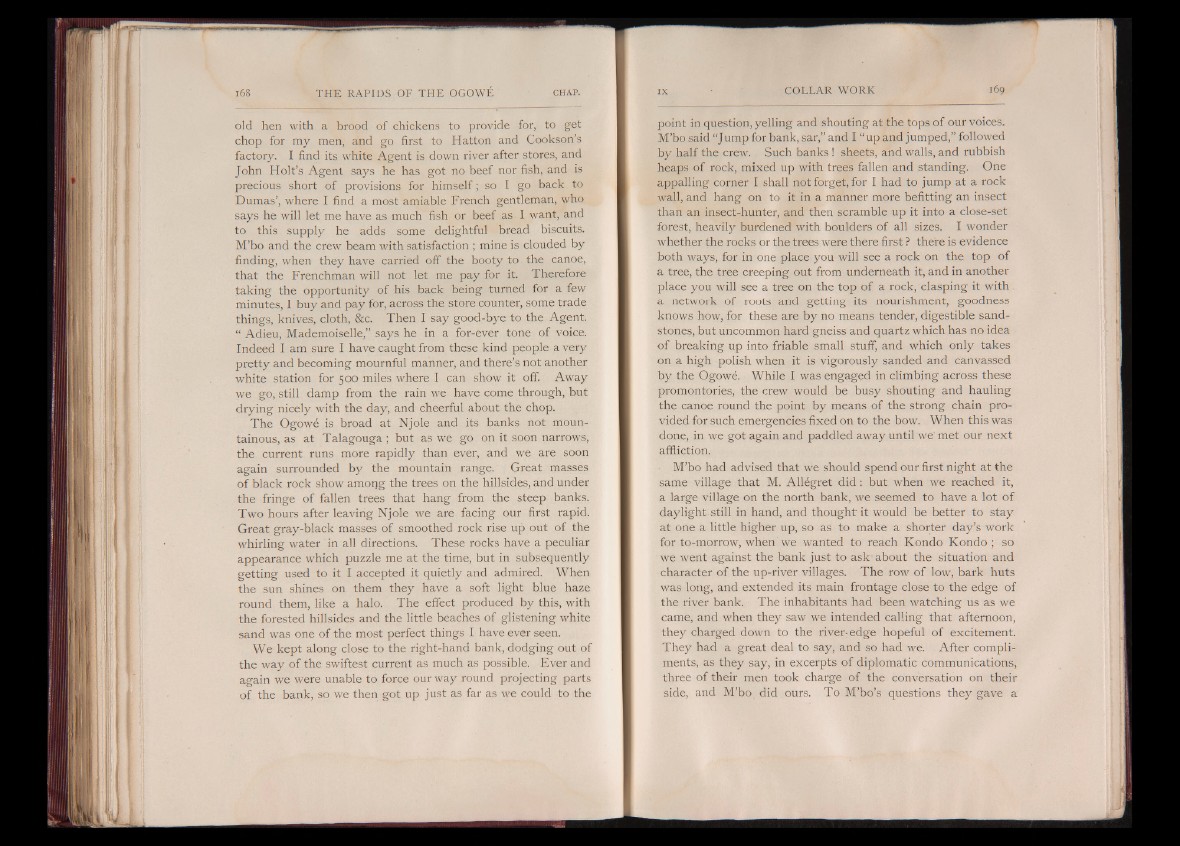
old hen with a brood of chickens to provide for, to get
chop for my men, and go first to Hatton and Cookson’s
factory. I find its white Agent is down river after stores, and
John Holt’s Agent says he has got no beef nor fish, and is
precious short of provisions for himself; so I go back to
Dumas’, where I find a most amiable French gentleman, who
says he will let me have as much fish or beef as I want, and
to this supply he adds some delightful bread biscuits.
M’bo and the crew beam with satisfaction ; mine is clouded by
finding, when they have carried off the booty to the canoe,
that the Frenchman will not let me pay for it. Therefore
taking the opportunity of his back being turned for a few
minutes, I buy and pay for, across the store counter, some trade
things, knives, cloth, &c. Then I say good-bye to the Agent.
“ Adieu, Mademoiselle,” says he in a for-ever tone of voice.
Indeed I am sure I have caught from these kind people a very
pretty and becoming mournful manner, and there’s not another
white station for 500 miles where I can show it off. Away
we go, still damp from the rain we have come through, but
drying nicely with the day, and cheerful about the chop.
The Ogow6 is broad at Njole and its banks not mountainous,
as at Talagouga; but as we go on it soon narrows,
the current runs more rapidly than ever, and we are soon
again surrounded by the mountain range. Great masses
of black rock show among the trees on the hillsides, and under
the fringe of fallen trees that hang from the steep banks.
Two hours after leaving Njole we are facing our first rapid.
Great gray-black masses of smoothed rock rise up out of the
whirling water in all directions. These rocks have a peculiar
appearance which puzzle me at the time, but in subsequently
getting used to it I accepted it quietly and admired. When
the sun shines on them they have a soft light blue haze
round them, like a halo. The effect produced by this, with
the forested hillsides and the little beaches of glistening white
sand was one of the most perfect things I have ever seen.
We kept along close to the right-hand bank, dodging out of
the way of the swiftest current as much as possible. Ever and
again we were unable to force our way round projecting parts
of the bank, so we then got up just as far as we could to the
point in question, yelling and shouting at the tops of our voices.
M’bo said “Jump for bank, sar,” and I “up and jumped,” followed
by half the crew. Such banks ! sheets, and walls, and rubbish
heaps of rock, mixed up with trees fallen and standing. One
appalling corner I shall not forget, for I had to jump at a rock
wall, and hang on to it in a manner more befitting an insect
than an insect-hunter, and then scramble up it into a close-set
forest, heavily burdened with boulders of all sizes. I wonder
whether the rocks or the trees were there first ? there is evidence
both ways, for in one place you will see a rock on the top of
a tree, the tree creeping out from underneath it, and in another
place you will see a tree on the top of a rock, clasping it w ith .
a network of roots and getting its nourishment, goodness
knows how, for these are by no means tender, digestible sandstones,
but uncommon hard gneiss and quartz which has no idea
o f breaking up into friable small stuff, and which only takes
on a high polish when it is vigorously sanded and canvassed
by the Ogowe. While I was engaged in climbing across these
promontories, the crew would be busy shouting and hauling
the canoe round the point by means of the strong chain provided
for such emergencies fixed on to the bow. When this was
done, in we got again and paddled away until we met our next
affliction.
M’bo had advised that we should spend our first night at the
same village that M. Allegret d id : but when we reached it,
a large village on the north bank, we seemed to have a lot of
daylight still in hand, and thought it would be better to stay
at one a little higher up, so as to make a shorter day’s work
for to-morrow, when we wanted to reach Kondo Kondo ; so
we went against the bank just to ask' about the situation and
character of the up-river villages. The row of low, bark huts
was long, and extended its main frontage close to the edge of
the river bank. The inhabitants had been watching us as we
came, and when they saw we intended calling that afternoon,
they charged down to the river-edge hopeful of excitement.
They had a great deal to say, and so had we. After compliments,
as they say, in excerpts of diplomatic communications,
three of their men took charge of the conversation on their
side, and M’bo did ours. To M’bo’s questions they gave a